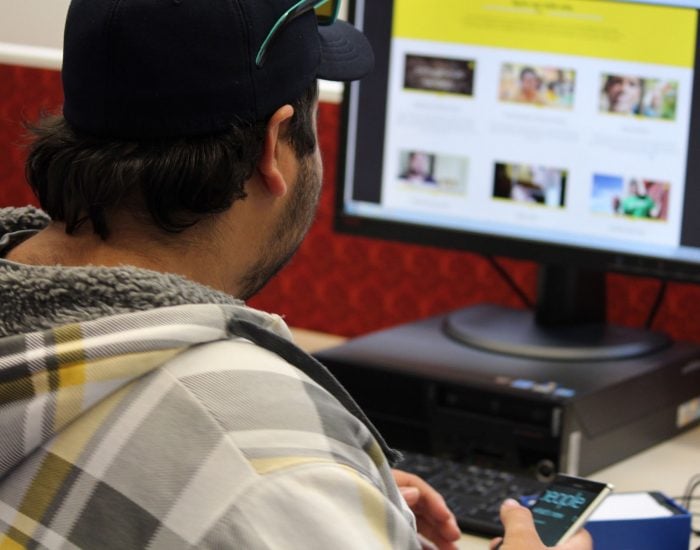For Aboriginal & Torres Strait Islander Dads
SMS4DeadlyDads sends short texts with tips, info and links to your phone just when you and your baby need it.
If you identify as Aboriginal or Torres Strait Islander, you’re sent a unique set of messages designed especially for First Nations dads.
The messages help dads
You can sign up online by entering your mobile number and your baby’s due or actual date of birth.
It’s FREE – and dads from all around Australia can join up


On 11 October SMS4DeadlyDads headed for Broome to host a Health and Community Workshop and yarn about ways to include & support dads in health services.
The response was fantastic and we are stoked to be working with you fellas.
We also headed over to Fitzroy Crossing for a community workshop and shared lunch.
Thanks for having us – it was great to meet so many deadly dads and health workers in your communities!
SMS4DeadlyDads sends three texts a week up until bub turns 1 year old. Messages include simple tips and info sent straight to your phone just when you and your baby need it.
Check out this video to find out more about how SMS4DeadlyDads works




We need your help to let dads around Australia know about SMS4DeadlyDads.
If you know of a mate who is expecting a bub or has a child under 12months old – make sure they know about SMS4DeadlyDads.
THANKS FOR YOUR HELP TO GET THE WORD OUT ABOUT THIS FREE SERVICE

Mick Adams University of Newcastle | Craig Hammond University of Newcastle Kaiden Powell Community member | Jacob Prehn University of Tasmania Kootsy Canuto Flinders University Northern Territory | Jason Bonson Flinders University Northern Territory | Steven Torres-Carne Community member Dallas Hure Community member | Peter Mitchell Outreach Service Aboriginal Corporation Broome | Steven Rossingh Miwatj Health Aboriginal Corporation NT Jack Bulman Mibbinbah Spirit Healing | Darrel Smith Miyay Birray Youth Service Kane Ellis Illawarra Aboriginal Medical Service NSW | Joe Russell NT Government Richard Fletcher University of Newcastle | James Smith Flinders University Northern Territory | Dave Edwards University of Newcastle | Bernard David Apunipima Cape York Health Council
Richard’s research revealed possible long-term negative impacts on the children of dads with mental health issues. Fathers’ depressive symptoms in the first year after the birth predicted behaviour problems in their children years later.
“If dads’ mental health has such a dramatic impact then we need to be screening dads for depression, not just mums,” Richard explains.
In response to these limitations, Richard and his team have designed a smart-phone based program that allows mobile connection for new and expectant dads.
Participants receive texts containing information and links, and self-report their mood. If the mood tracker identifies dads as needing extra support, they will be offered a phone call from a counsellor trained in this area.
Following the success of the pilot of the SMS4dads program, Funding was received to enable a National roll-out.
“When dad’s miss antenatal classes or activities, they also miss out on contact and links to other people. They may never get the chance to say to anyone, look I’m really stressed,” he points out.
“SMS4dads is a way of bringing dads into the health system and keeping them linked in with services and support,” explains Richard.
Richard credits a varied career, a talented and innovative team, and much life experience for affording him the insight needed to address the challenges related to actively engaging dads.
After completing his masters in Medical Science, studying epidemiology, Richard earned his PhD focusing on fathers and attachment.
“Fathers are invisible in many places, and that is endemic. Not because people dislike fathers, but because the system is set up to be focused on mothers.”
Some services and organisations are aware of the need to engage dads, but have been unsuccessful in their attempts.
“When people are challenged about this, they generally want dads involved,” Richard affirms.
“Often, however, they just don’t know how to do it.”
Richard works with health professionals on issues related to fathers, and has delivered many antenatal programs for expectant dads.
He credits his own family with giving him an understanding of the role of fathers needed to make his work relevant.
“I have three daughters and two stepdaughters,”
“My kids would say they taught me just about everything I know and they’d be right. They’ve taught me a lot, and still do.”
Richard’s research revealed possible long-term negative impacts on the children of dads with mental health issues. Fathers’ depressive symptoms in the first year after the birth predicted behaviour problems in their children years later.
“If dads’ mental health has such a dramatic impact then we need to be screening dads for depression, not just mums,” Richard explains.
In response to these limitations, Richard and his team have designed a smart-phone based program that allows mobile connection for new and expectant dads.
Participants receive texts containing information and links, and self-report their mood. If the mood tracker identifies dads as needing extra support, they will be offered a phone call from a counsellor trained in this area.
Following the success of the pilot of the SMS4dads program, Funding was received to enable a National roll-out.
“When dad’s miss antenatal classes or activities, they also miss out on contact and links to other people. They may never get the chance to say to anyone, look I’m really stressed,” he points out.
“SMS4dads is a way of bringing dads into the health system and keeping them linked in with services and support,” explains Richard.